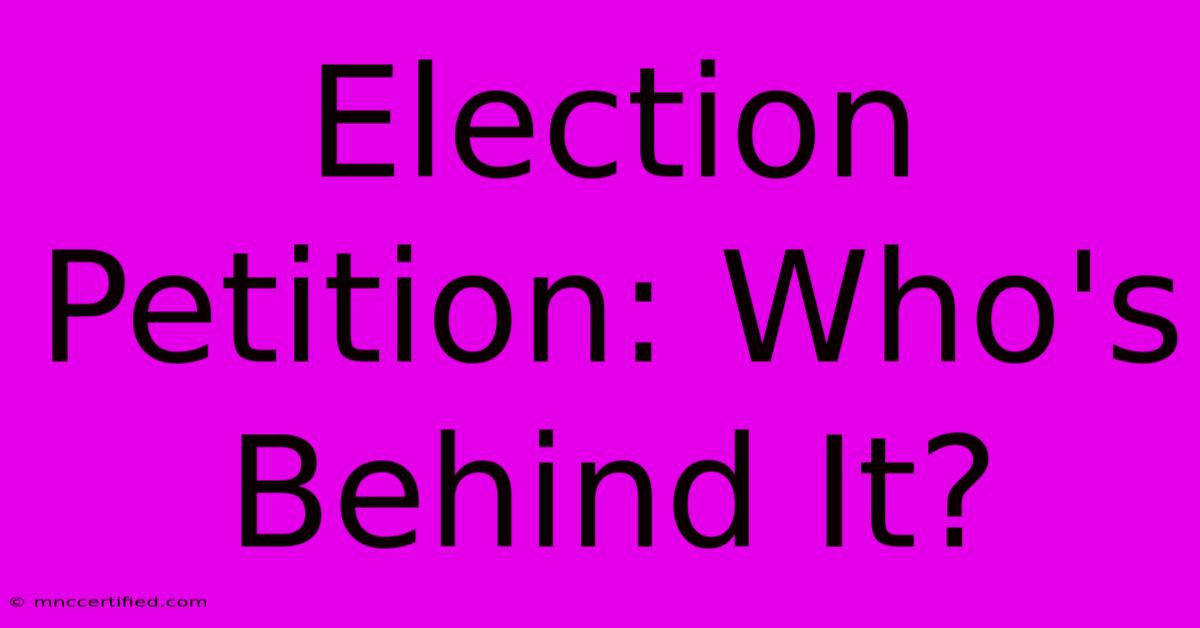Election Petition: Who's Behind It?

Table of Contents
Election Petition: Who's Behind It? Unmasking the Players and the Power Dynamics
Election petitions—legal challenges to the outcome of an election—are a cornerstone of democratic processes. They provide a vital mechanism for ensuring fairness and accountability. But understanding who initiates these petitions, and the often complex motivations behind them, is crucial to comprehending their impact on the political landscape. This article delves into the various actors involved in election petitions, exploring their motivations and the broader implications of their actions.
The Key Players in an Election Petition
Several key players typically emerge in the drama surrounding an election petition:
1. The Petitioner: The Challenger of the Results
The petitioner is the individual or group who believes the election was conducted unfairly and seeks to overturn the results. This could be:
- The losing candidate: Often, the runner-up in the election will file a petition if they believe irregularities significantly impacted the outcome. Their motivation is clear: to claim victory or, at the very least, force a re-election.
- A concerned citizen: In some jurisdictions, citizens who weren't candidates can file petitions if they possess credible evidence of widespread electoral fraud or malpractice. This demonstrates civic engagement and a commitment to electoral integrity.
- Political parties: Parties may support or directly file petitions against candidates from opposing parties, aiming to undermine their legitimacy and gain a political advantage. This often involves strategic resource allocation and coordinated efforts.
2. The Respondent: The Winner Under Scrutiny
The respondent is the elected official whose victory is being challenged. They are tasked with defending the legitimacy of their election. Their actions will often involve:
- Legal representation: High-profile cases usually see the respondent engaging top legal counsel to build a robust defense and challenge the petitioner’s claims.
- Public relations strategy: Respondents will frequently employ PR strategies to counter negative narratives surrounding the petition and maintain public support.
- Political maneuvering: Depending on the political climate, the respondent might attempt to negotiate with the petitioner or engage in behind-the-scenes deals to resolve the matter.
3. The Electoral Commission: The Overseer of the Process
The electoral commission plays a crucial role as the impartial arbiter. Its responsibilities include:
- Investigating the claims: The commission is responsible for reviewing the evidence presented by both sides, ensuring a thorough and unbiased investigation.
- Providing evidence: The commission often holds crucial evidence relating to voter turnout, ballot counts, and other election-related data.
- Maintaining neutrality: The commission must maintain its impartiality throughout the process, ensuring that all parties are treated fairly.
4. The Judiciary: The Final Arbiters of Justice
The judiciary ultimately determines the outcome of the petition. Their role is to:
- Review the evidence: Judges meticulously review the evidence presented by all parties, assessing its credibility and relevance.
- Apply the law: Judges apply relevant election laws and legal precedents to the facts of the case.
- Deliver a judgment: Their decision determines whether the election results are upheld or overturned, potentially leading to a re-election or other legal consequences.
The Broader Implications and Motivations
The motivations behind election petitions are complex and often extend beyond simply challenging the election's outcome. These can include:
- Power dynamics: Petitions can be tools used to shift power balances within the political system.
- Financial incentives: In some cases, financial incentives or external funding may influence the initiation and pursuit of an election petition.
- Public perception: Even if unsuccessful, a petition can damage the reputation of the elected official and impact public trust in the electoral process.
Understanding the various players and their motivations in election petitions is vital for a comprehensive understanding of democratic processes and accountability. While they can sometimes be tools for political maneuvering, they ultimately serve as a critical safeguard against electoral malpractice and ensure the integrity of the democratic process. The careful scrutiny applied by the judiciary ensures that only well-founded claims are successful, safeguarding the legitimacy of elected officials and strengthening the public's faith in democratic institutions.

Thank you for visiting our website wich cover about Election Petition: Who's Behind It?. We hope the information provided has been useful to you. Feel free to contact us if you have any questions or need further assistance. See you next time and dont miss to bookmark.
Featured Posts
-
Hammond Indiana Auto Insurance
Nov 27, 2024
-
3 3 Draw Man City Vs Feyenoord Stats
Nov 27, 2024
-
Sheffield United Oxford United Live Score Update
Nov 27, 2024
-
Homeowners Insurance In Mexico
Nov 27, 2024
-
Sebanda Insurance Phone Number
Nov 27, 2024